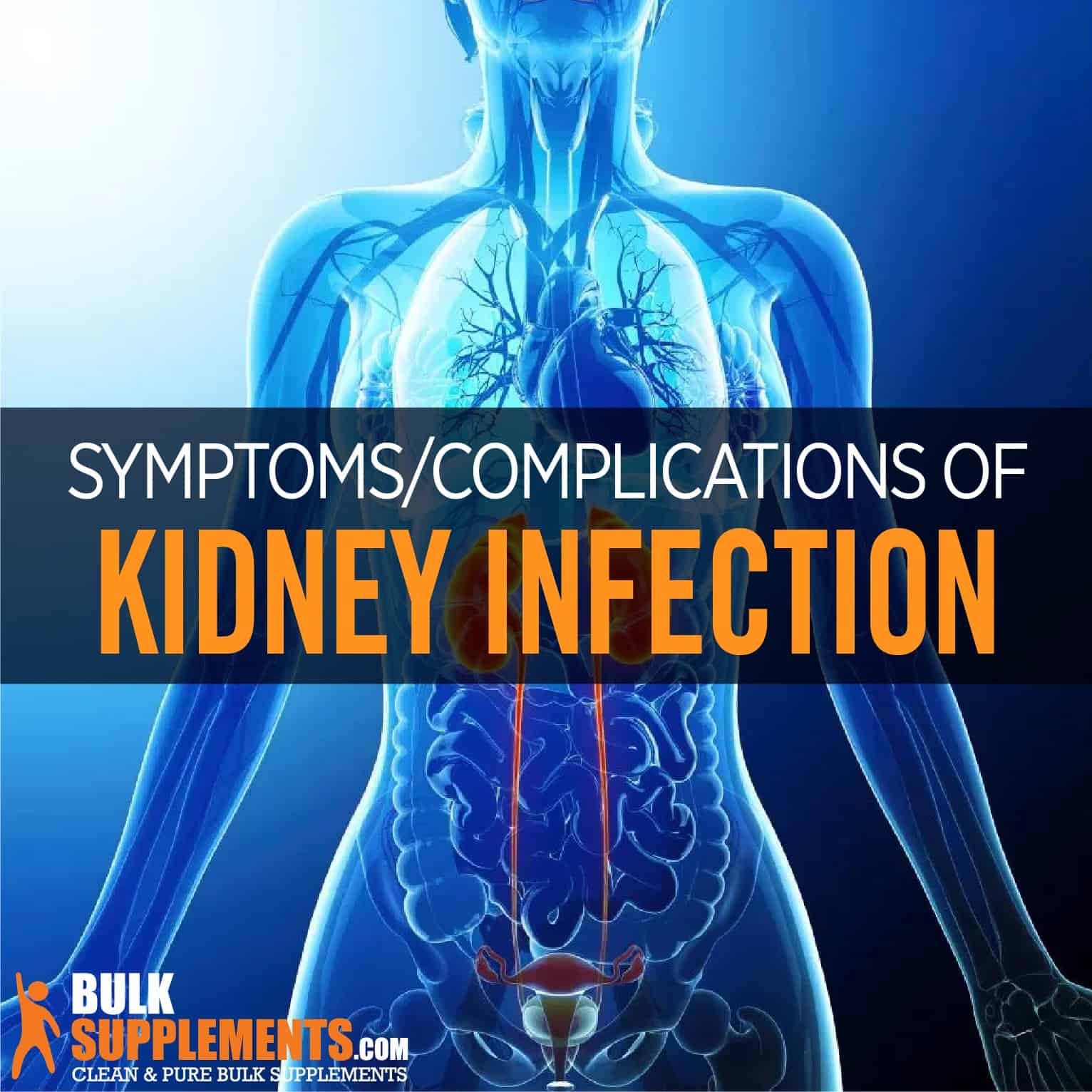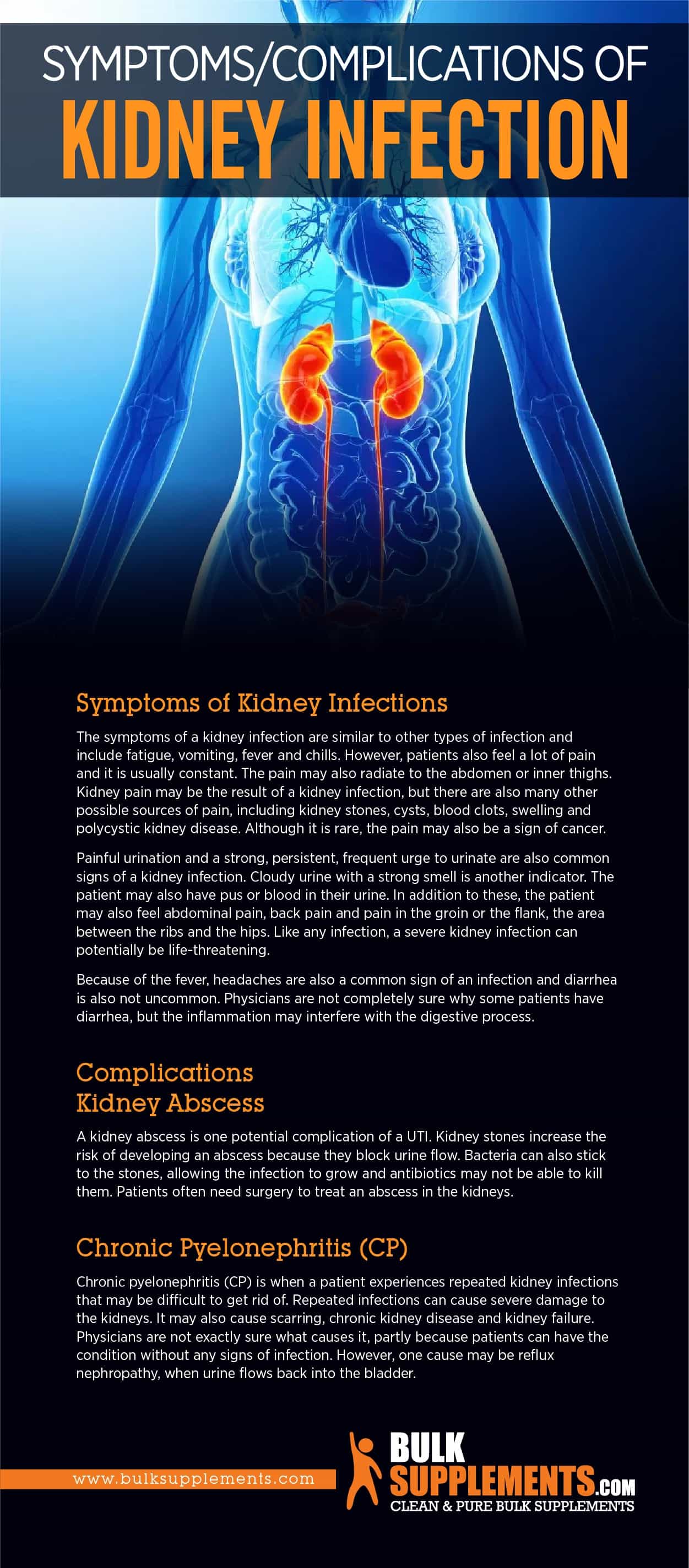Kidney Infection (Pyelonephritis): Causes, Symptoms & Treatment
by James Denlinger Digital Marketing Strategist
What is a Kidney Infection?
A urinary tract infection (UTI) is the second most common type of infection in the United States. The first is an upper respiratory infection or the common cold. The kidneys are part of the urinary tract, so a kidney infection (pyelonephritis) is a type of urinary tract infection. Although it is less common than a bladder infection, a kidney infection can be serious because it may cause permanent damage to the kidneys. Bacteria can also spread into the bloodstream via the kidneys and potentially cause life-threatening infections.
Symptoms of Kidney Infections
The symptoms of a kidney infection are similar to other types of infection and include fatigue, vomiting, fever and chills. However, patients also feel a lot of pain and it is usually constant. The pain may also radiate to the abdomen or inner thighs. Kidney pain may be the result of a kidney infection, but there are also many other possible sources of pain, including kidney stones, cysts, blood clots, swelling and polycystic kidney disease. Although it is rare, the pain may also be a sign of cancer.
Painful urination and a strong, persistent, frequent urge to urinate are also common signs of a kidney infection. Cloudy urine with a strong smell is another indicator. The patient may also have pus or blood in their urine. In addition to these, the patient may also feel abdominal pain, back pain and pain in the groin or the flank, the area between the ribs and the hips. Like any infection, a severe kidney infection can potentially be life-threatening.
Because of the fever, headaches are also a common sign of an infection and diarrhea is also not uncommon. Physicians are not completely sure why some patients have diarrhea, but the inflammation may interfere with the digestive process.
Complications
Kidney Abscess
A kidney abscess is one potential complication of a UTI. Kidney stones increase the risk of developing an abscess because they block urine flow. Bacteria can also stick to the stones, allowing the infection to grow and antibiotics may not be able to kill them. Patients often need surgery to treat an abscess in the kidneys.
Chronic Pyelonephritis (CP)
Chronic pyelonephritis (CP) is when a patient experiences repeated kidney infections that may be difficult to get rid of. Repeated infections can cause severe damage to the kidneys. It may also cause scarring, chronic kidney disease and kidney failure. Physicians are not exactly sure what causes it, partly because patients can have the condition without any signs of infection. However, one cause may be reflux nephropathy, when urine flows back into the bladder.

Causes of Kidney Infections
Usually, a patient develops a kidney infection from bacteria and research estimates that 90 percent of UTI infections are from an E. coli infection. Bacteria can enter the urinary tract through the urethra, the tube that transports urine out of the body. While bacteria are the most common cause, the infection may also stem from a fungus, virus or parasite. For example, a candida fungus that commonly causes yeast infections may also trigger a kidney infection. The herpes simplex virus type 2 may also cause infections in the urethra, which can affect the kidneys. In addition, there are several different parasites that may cause a kidney infection, including trichomoniasis, schistosomiasis and filariasis.
Risk Factors for Kidney Infections
Biological Gender & Sexual Intercourse
Women are more likely to develop kidney infections than men because they have a shorter urethra, which makes it easier for bacteria to enter through the urinary tract. Sexual intercourse also puts the patient at risk for exposure to bacteria that may cause infection. Urinating after sex can help reduce the risk of a kidney infection.
Pregnancy
Pregnant women run even higher risks of kidney infections because of the increased pressure on the urinary tract. The kidneys and uterus grow, compressing the ureters and the bladder. These changes can make it more difficult to empty the bladder and increase the risk of a urinary tract infection. Kidney infections during pregnancy can cause complications, such as low birth weight.
Alcohol
While alcohol is not usually a direct cause of a kidney infection, it affects kidney function which can lead to infections, pain and swelling. Alcohol is also a diuretic and it can affect the way the kidneys function, upsetting the body’s delicate fluid and electrolyte balance. It can also raise blood pressure and worsen conditions like kidney stones.
Caffeine
Drinking caffeine may also impact a patient’s chances of developing a kidney infection. Caffeine is a diuretic that research links to kidney stones and renal failure. Moderate amounts of caffeine should not have a negative effect on the kidneys, but patients who currently have a kidney infection should avoid it to speed up recovery.
Compromised Immune System
Diseases like diabetes, HIV and any other conditions that weaken the immune system can increase the risk of developing infections. If a patient has a bacterial or fungal infection on the skin, the organisms may enter the bloodstream and infect the urinary tract. Kidney transplant patients may also take immunosuppressants that keep the body from rejecting the new organ. However, these medications can increase the risk of infections.
Diagnosis for Kidney Infections
First, the physician will collect information about the patient’s medical history to identify any risk factors and perform a physical exam to address the patient’s symptoms. To test for a kidney infection, a doctor will ask for a urine sample to check for bacteria, blood or pus in the urine. The test helps the doctor identify bacteria and white blood cells. Male patients require a digital rectal examination (DRE) to check for a swollen prostate that may block the bladder.
Treatment for Kidney Infections
Usually doctors use antibiotics to treat a kidney infection to fight common types of bacteria before the patient’s lab results confirm the specific type of bacteria. After the results come back, the doctor may switch antibiotics to eliminate that particular bacteria. Recovery time depends on the severity of the infection and the patient’s overall health. Patients may require hospitalization for bed rest or even surgery if it causes complications.
Home Remedies
To help cope with the pain, patients may find relief with a heating pad or warm compress on the abdomen or lower back. Drink plenty of water to flush bacteria from the body. Eat nutrient-dense foods to help boost the immune system. Limit alcohol, caffeine, sugar, artificial sweeteners, spices, acidic foods and chocolate to avoid irritating the kidneys. Also, wear loose clothing and cotton underwear to prevent heat and moisture from accumulating in the groin, which can cause bacteria and yeast to grow.
Preventing Kidney Infections
Eat a Balanced Diet
To reduce the chances of developing a kidney infection, drink plenty of water every day. Drinking fluids helps to flush toxins from the bladder and the urinary tract.
Research states that cranberry juice may also be an effective dietary tool for a healthy urinary tract. It has large amounts of phytochemicals that can help keep E. coli bacteria from sticking to the urinary tract walls so that patients can eliminate them in their urine. Patients can also benefit from quality probiotics and fermented foods. These foods can help balance bacteria in the body.
Pay Attention to Hygiene
As for succumbing to the need to use the bathroom, don’t wait. If you feel the urge, go. Use good hygiene and wipe carefully from front to back to avoid spreading bacteria. Feminine hygiene products and douches are not necessary and can upset the natural balance of flora in the genital area, killing the good bacteria that help to keep the body healthy. Plain soap and water work fine. Women should use the bathroom as soon as possible after sex to reduce the amount of bacteria the urethra is exposed to, reducing the likelihood of developing an infection.
Supplements for a Healthy Urinary Tract
D-Mannose
D-mannose is a natural simple sugar very similar to glucose that is found in certain fruits and vegetables such as cranberries, peaches and green beans. It helps promote urinary tract health, especially in combination with cranberry, dandelion root and vitamin C. In clinical trials, researchers concluded that the supplement may be as effective as antibiotics. The recommended dosage for D-mannose powder is 2,000 mg once a day with water. Consult a doctor before taking this supplement.
Cranberry Extract
Cranberry has a long traditional history for remedying UTIs. Also, cranberry juice contains D-mannose, which may work as well as antibiotics for urinary tract infections. Other studies on cranberry juice validate this claim. But since cranberry juice can be high in calories and sugar, cranberry extract powder supplements may offer a better way to reap the beneficial effects. Take 400 mg one to three times daily, or as directed by a doctor.
Potassium
Potassium reduces urine acidity, helping to prevent crystals from forming that may become kidney stones. Raw fruits and vegetables contain potassium, especially citrus fruits like grapefruit and oranges. But it is also present in leafy greens and some fish. For patients who are prone to UTIs, it may be difficult to get enough through diet alone and potassium citrate supplements can offer beneficial effects without having to eat a mountain of collard greens. The recommended daily dose is 275 mg per day. Consult with a doctor for approval before taking this supplement.
Tribulus Terrestris
Tribulus terrestris is an Ayurvedic remedy that has a long tradition as a urinary anti-infective and diuretic. It can help treat urinary tract infections by eliminating bacteria, specifically E. coli. Research also states that it may also be able to treat urinary stones. The recommended dosage for tribulus terrestris extract is between 600 and 1,000 mg twice a day with meals. Follow a healthcare practitioner’s instructions.
Turmeric
The herb turmeric is another traditional remedy used in traditional Chinese and Ayurvedic medicine to treat a wide variety of illnesses, including kidney disorders. Its active ingredient is curcumin, which contains powerful antioxidants that may reduce inflammation and damage from free radicals. The recommended dosage for turmeric root extract powder is 1,000 mg three times per day with food and water if a doctor approves the dosage.
Bottom Line
Kidney infections are a type of urinary tract infection that may cause permanent damage to the kidneys. Patients feel pain in the kidneys, burning or painful urination, cloudy urine, fatigue and fever. Infection may also cause diarrhea, vomiting and back pain. Usually kidney infections are bacterial, specifically from E. coli bacteria. But they may also develop from a fungal infection, viral infection or a parasite. Kidney infections can cause serious complications, including chronic infections that can cause kidney failure.
Treatment usually involves antibiotics to eliminate bacteria in the urinary tract. Patients can also make dietary changes to keep the body healthy and potentially prevent infections in the first place. Fruits, vegetables, probiotics and fermented foods can help and drinking plenty of water helps eliminate toxins from the body. Dietary supplements are also available to promote a healthy urinary tract and help fight bacteria. Always consult a doctor before taking supplements. They are not a cure for kidney infections or any other conditions, but they aim to improve overall health.
Sponsor Ads
Created on Mar 2nd 2020 16:59. Viewed 289 times.



